Deck 3: Kinematics in Two Dimensions; Vectors
Question
Question
Question
Question
Question
Question
Question
Question
Question
Question
Question
Question
Question
Question
Question
Question
Question
Question
Question
Question
Question
Question
Question
Question
Question
Question
Question
Question
Question
Question
Question
Question
Question
Question
Question
Question
Question
Question
Question
Question
Question
Question
Question
Question
Question
Question
Question
Question
Question
Question
Question
Question
Question
Question
Question
Question
Question
Question
Question
Question
Question
Question
Question
Question
Question
Question
Question
Question
Question
Question
Question
Question
Question
Question
Question
Question
Question
Question
Question
Question

Unlock Deck
Sign up to unlock the cards in this deck!
Unlock Deck
Unlock Deck
1/183
Play
Full screen (f)
Deck 3: Kinematics in Two Dimensions; Vectors
1
Choose the one alternative that best completes the statement or answers the question.
Vector has magnitude 2 units and is directed to the north. Vector
has magnitude 2 units and is directed to the north. Vector  has magnitude 5 units and is directed to the south. Calculate the magnitude and direction of
has magnitude 5 units and is directed to the south. Calculate the magnitude and direction of 
A) 7 units, north
B) 3 units, north
C) 3 units, south
D) 7 units, south
Vector
 has magnitude 2 units and is directed to the north. Vector
has magnitude 2 units and is directed to the north. Vector  has magnitude 5 units and is directed to the south. Calculate the magnitude and direction of
has magnitude 5 units and is directed to the south. Calculate the magnitude and direction of 
A) 7 units, north
B) 3 units, north
C) 3 units, south
D) 7 units, south
7 units, north
2
Choose the one alternative that best completes the statement or answers the question.
A player throws a football 50.0 m at 61.0° north of west. What is the westward component of the displacement of the football?
A) 64.7m
B) 74.0 m
C) 55.0 m
D) 0.00 m
E) 24.2 m
A player throws a football 50.0 m at 61.0° north of west. What is the westward component of the displacement of the football?
A) 64.7m
B) 74.0 m
C) 55.0 m
D) 0.00 m
E) 24.2 m
24.2 m
3
Choose the one alternative that best completes the statement or answers the question.
The x component of vector is 5.3 units, and its y component is -2.3 units. The angle that vector
is 5.3 units, and its y component is -2.3 units. The angle that vector  makes with the +x -axis is closest to
makes with the +x -axis is closest to
A)
B)
C)
D)
E)
The x component of vector
 is 5.3 units, and its y component is -2.3 units. The angle that vector
is 5.3 units, and its y component is -2.3 units. The angle that vector  makes with the +x -axis is closest to
makes with the +x -axis is closest toA)

B)

C)

D)

E)


4
Write the word or phrase that best completes each statement or answers the question.
A vector has components
has components 
(a) What is the angle that vector makes with the
makes with the 
(b) What is the magnitude of vector
A vector
 has components
has components 
(a) What is the angle that vector
 makes with the
makes with the 
(b) What is the magnitude of vector


Unlock Deck
Unlock for access to all 183 flashcards in this deck.
Unlock Deck
k this deck
5
Choose the one alternative that best completes the statement or answers the question.
A boy jumps with a velocity of magnitude 20.0 m/s at an angle of above the horizontal. What is the horizontal component of the boy's velocity?
above the horizontal. What is the horizontal component of the boy's velocity?
A) 15.6 m/s
B) 12.6 m/s
C) 8.45 m/s
D) 9.33 m/s
E) 18.1 m/s
A boy jumps with a velocity of magnitude 20.0 m/s at an angle of
 above the horizontal. What is the horizontal component of the boy's velocity?
above the horizontal. What is the horizontal component of the boy's velocity?A) 15.6 m/s
B) 12.6 m/s
C) 8.45 m/s
D) 9.33 m/s
E) 18.1 m/s

Unlock Deck
Unlock for access to all 183 flashcards in this deck.
Unlock Deck
k this deck
6
Choose the one alternative that best completes the statement or answers the question.
When rolled down a mountainside at 7.0 m/s, the horizontal component of its velocity vector was 1.8 m/s. What was the angle of the mountain surface above the horizontal?
A)
B)
C)
D)
When rolled down a mountainside at 7.0 m/s, the horizontal component of its velocity vector was 1.8 m/s. What was the angle of the mountain surface above the horizontal?
A)

B)

C)

D)


Unlock Deck
Unlock for access to all 183 flashcards in this deck.
Unlock Deck
k this deck
7
Choose the one alternative that best completes the statement or answers the question.
If vector has components
has components  and vector
and vector  has components
has components 
Ib and what is the magnitude of vector
what is the magnitude of vector 
A) 140 lb
B) 16 lb
C) 13 lb
D) 7.2 lb
If vector
 has components
has components  and vector
and vector  has components
has components 
Ib and
 what is the magnitude of vector
what is the magnitude of vector 
A) 140 lb
B) 16 lb
C) 13 lb
D) 7.2 lb

Unlock Deck
Unlock for access to all 183 flashcards in this deck.
Unlock Deck
k this deck
8
Choose the one alternative that best completes the statement or answers the question.
You walk 33 m to the north, then turn to your right and walk another 45 m. How far are you from where you originally started?
to your right and walk another 45 m. How far are you from where you originally started?
A) 35 m
B) 75 m
C) 68 m
D) 39 m
You walk 33 m to the north, then turn
 to your right and walk another 45 m. How far are you from where you originally started?
to your right and walk another 45 m. How far are you from where you originally started?A) 35 m
B) 75 m
C) 68 m
D) 39 m

Unlock Deck
Unlock for access to all 183 flashcards in this deck.
Unlock Deck
k this deck
9
Choose the one alternative that best completes the statement or answers the question.
When Jeff ran up a hill at 7.0 m/s, the horizontal component of his velocity vector was 5.1 m/s. What was the vertical component of Jeff's velocity?
A) 3.4 m/s
B) 3.8 m/s
C) 4.8 m/s
D) 4.3 m/s
When Jeff ran up a hill at 7.0 m/s, the horizontal component of his velocity vector was 5.1 m/s. What was the vertical component of Jeff's velocity?
A) 3.4 m/s
B) 3.8 m/s
C) 4.8 m/s
D) 4.3 m/s

Unlock Deck
Unlock for access to all 183 flashcards in this deck.
Unlock Deck
k this deck
10
Choose the one alternative that best completes the statement or answers the question.
The components of vectors and
and  are given as follows:
are given as follows:

The angle (less than 180°) between vectors is closest to
is closest to
A)
B)
C)
D)
E)
The components of vectors
 and
and  are given as follows:
are given as follows:
The angle (less than 180°) between vectors
 is closest to
is closest toA)

B)

C)

D)

E)


Unlock Deck
Unlock for access to all 183 flashcards in this deck.
Unlock Deck
k this deck
11
Write the word or phrase that best completes each statement or answers the question.
The x and y components of a vector in a horizontal plane are 4.00 m and 3.00 m,
respectively.
(a) What is the magnitude of this vector?
(b) What angle does this vector make with the positive +y-axis.
The x and y components of a vector in a horizontal plane are 4.00 m and 3.00 m,
respectively.
(a) What is the magnitude of this vector?
(b) What angle does this vector make with the positive +y-axis.

Unlock Deck
Unlock for access to all 183 flashcards in this deck.
Unlock Deck
k this deck
12
Write the word or phrase that best completes each statement or answers the question.
A velocity vector has components 36 m/s westward and 22 m/s northward. What are the
magnitude and direction of this vector?
A velocity vector has components 36 m/s westward and 22 m/s northward. What are the
magnitude and direction of this vector?

Unlock Deck
Unlock for access to all 183 flashcards in this deck.
Unlock Deck
k this deck
13
Choose the one alternative that best completes the statement or answers the question.
A displacement vector is 34.0 m in length and is directed east of north. Selecting from the choices in the table below, what are the components of this vector?
east of north. Selecting from the choices in the table below, what are the components of this vector?
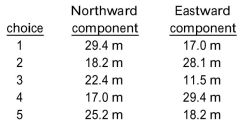
A) Choice 1
B) choice 2
C) choice 3
D) choice 4
E) choice
A displacement vector is 34.0 m in length and is directed
 east of north. Selecting from the choices in the table below, what are the components of this vector?
east of north. Selecting from the choices in the table below, what are the components of this vector? 
A) Choice 1
B) choice 2
C) choice 3
D) choice 4
E) choice

Unlock Deck
Unlock for access to all 183 flashcards in this deck.
Unlock Deck
k this deck
14
Choose the one alternative that best completes the statement or answers the question.
The components of vectors are given as follows:
are given as follows:

What is the magnitude of the vector difference
A) 16
B) 3.5
C) 170
D) 3.4
E) 13
The components of vectors
 are given as follows:
are given as follows:
What is the magnitude of the vector difference

A) 16
B) 3.5
C) 170
D) 3.4
E) 13

Unlock Deck
Unlock for access to all 183 flashcards in this deck.
Unlock Deck
k this deck
15
Choose the one alternative that best completes the statement or answers the question.
The x component of vector is 8.7 units, and its y component is -6.5 units. The magnitude of
is 8.7 units, and its y component is -6.5 units. The magnitude of  is closest to
is closest to
A) 9.9 units
B) 12 units
C) 11 units
D) 7.9 units
E) 8.9 units
The x component of vector
 is 8.7 units, and its y component is -6.5 units. The magnitude of
is 8.7 units, and its y component is -6.5 units. The magnitude of  is closest to
is closest toA) 9.9 units
B) 12 units
C) 11 units
D) 7.9 units
E) 8.9 units

Unlock Deck
Unlock for access to all 183 flashcards in this deck.
Unlock Deck
k this deck
16
Choose the one alternative that best completes the statement or answers the question.
The magnitude of is 5.5 m, and this vector lies in the second quadrant and makes an angle of 34 - with the +y -axis. The components of
is 5.5 m, and this vector lies in the second quadrant and makes an angle of 34 - with the +y -axis. The components of  are closest to:
are closest to:
A)
B)
C)
D)
E)
The magnitude of
 is 5.5 m, and this vector lies in the second quadrant and makes an angle of 34 - with the +y -axis. The components of
is 5.5 m, and this vector lies in the second quadrant and makes an angle of 34 - with the +y -axis. The components of  are closest to:
are closest to:A)

B)

C)

D)

E)


Unlock Deck
Unlock for access to all 183 flashcards in this deck.
Unlock Deck
k this deck
17
Choose the one alternative that best completes the statement or answers the question.
Two perpendicular vectors, , are added together giving vector
, are added together giving vector  If the magnitudes of both vectors
If the magnitudes of both vectors  are doubled without changing their directions, the magnitude of vector
are doubled without changing their directions, the magnitude of vector  will
will
A) increase by a factor of
B) increase by a factor of 2 .
C) increase by a factor of 8 .
D) increase by a factor of 4 .
E) not change.
Two perpendicular vectors,
 , are added together giving vector
, are added together giving vector  If the magnitudes of both vectors
If the magnitudes of both vectors  are doubled without changing their directions, the magnitude of vector
are doubled without changing their directions, the magnitude of vector  will
willA) increase by a factor of

B) increase by a factor of 2 .
C) increase by a factor of 8 .
D) increase by a factor of 4 .
E) not change.

Unlock Deck
Unlock for access to all 183 flashcards in this deck.
Unlock Deck
k this deck
18
Write the word or phrase that best completes each statement or answers the question.
A vector in the xy -plane has an x component of -7.50 units. What must be the y component of this vector so that its magnitude is 10.0 units. (Note: There are two possible answers.)
A vector in the xy -plane has an x component of -7.50 units. What must be the y component of this vector so that its magnitude is 10.0 units. (Note: There are two possible answers.)

Unlock Deck
Unlock for access to all 183 flashcards in this deck.
Unlock Deck
k this deck
19
Choose the one alternative that best completes the statement or answers the question.
A car travels 20 km west and then 20 km south. What is the magnitude of its displacement vector?
A) 40 km
B) 20 km
C) 28 km
D) 0 km
A car travels 20 km west and then 20 km south. What is the magnitude of its displacement vector?
A) 40 km
B) 20 km
C) 28 km
D) 0 km

Unlock Deck
Unlock for access to all 183 flashcards in this deck.
Unlock Deck
k this deck
20
Choose the one alternative that best completes the statement or answers the question.
You walk 53 m to the north, then you turn to your right and walk another 45 m. Determine the direction of your displacement vector. Express your answer as an angle relative to east.
to your right and walk another 45 m. Determine the direction of your displacement vector. Express your answer as an angle relative to east.
A)
B)
C)
D)
You walk 53 m to the north, then you turn
 to your right and walk another 45 m. Determine the direction of your displacement vector. Express your answer as an angle relative to east.
to your right and walk another 45 m. Determine the direction of your displacement vector. Express your answer as an angle relative to east.A)

B)

C)

D)


Unlock Deck
Unlock for access to all 183 flashcards in this deck.
Unlock Deck
k this deck
21
Write the word or phrase that best completes each statement or answers the question.
Displacement vector is 75cm long and points at
is 75cm long and points at  above the +x -axis. Displacement vector
above the +x -axis. Displacement vector  is 25 cm long and points along the -x -axis. Displacement vector
is 25 cm long and points along the -x -axis. Displacement vector  is 40 cm long and points at
is 40 cm long and points at  below the -x -axis.
below the -x -axis.
(a) Determine the x and y components of vector
(b) Determine the x and y components of vector
(c) Determine the x and y components of vector
(d) Determine the x and y components of the resultant of these three vectors.
(e) Determine the magnitude and direction of the resultant of these three vectors.
Displacement vector
 is 75cm long and points at
is 75cm long and points at  above the +x -axis. Displacement vector
above the +x -axis. Displacement vector  is 25 cm long and points along the -x -axis. Displacement vector
is 25 cm long and points along the -x -axis. Displacement vector  is 40 cm long and points at
is 40 cm long and points at  below the -x -axis.
below the -x -axis.(a) Determine the x and y components of vector

(b) Determine the x and y components of vector

(c) Determine the x and y components of vector

(d) Determine the x and y components of the resultant of these three vectors.
(e) Determine the magnitude and direction of the resultant of these three vectors.

Unlock Deck
Unlock for access to all 183 flashcards in this deck.
Unlock Deck
k this deck
22
Choose the one alternative that best completes the statement or answers the question.
Vector has a magnitude of 6.0 m and points
has a magnitude of 6.0 m and points  north of east. Vector
north of east. Vector  has a magnitude of 4.0 m and points
has a magnitude of 4.0 m and points  east of north. The resultant vector
east of north. The resultant vector  is given by
is given by
A) 1.1 m at an angle of north of east.
north of east.
B) 14 m at an angle of north of east.
north of east.
C) 9.7 m at an angle of north of east.
north of east.
D) 2.0 m at an angle of north of east.
north of east.
E) 0.70 m at an angle of north of east.
north of east.
Vector
 has a magnitude of 6.0 m and points
has a magnitude of 6.0 m and points  north of east. Vector
north of east. Vector  has a magnitude of 4.0 m and points
has a magnitude of 4.0 m and points  east of north. The resultant vector
east of north. The resultant vector  is given by
is given byA) 1.1 m at an angle of
 north of east.
north of east.B) 14 m at an angle of
 north of east.
north of east.C) 9.7 m at an angle of
 north of east.
north of east.D) 2.0 m at an angle of
 north of east.
north of east.E) 0.70 m at an angle of
 north of east.
north of east.
Unlock Deck
Unlock for access to all 183 flashcards in this deck.
Unlock Deck
k this deck
23
Write the word or phrase that best completes each statement or answers the question.
The figure shows two vectors , along with their magnitudes and directions. The vector
, along with their magnitudes and directions. The vector  is given by
is given by 
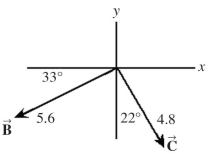
(a) What is the magnitude of vector
(b) What angle does vector make with the +x -axis?
make with the +x -axis?
The figure shows two vectors
 , along with their magnitudes and directions. The vector
, along with their magnitudes and directions. The vector  is given by
is given by 

(a) What is the magnitude of vector

(b) What angle does vector
 make with the +x -axis?
make with the +x -axis?
Unlock Deck
Unlock for access to all 183 flashcards in this deck.
Unlock Deck
k this deck
24
Choose the one alternative that best completes the statement or answers the question.
The figure shows three vectors and their magnitudes and relative directions. The magnitude of the resultant of the three vectors is closest to

A) 19
B) 13
C) 10
D) 7.0
E) 16
The figure shows three vectors and their magnitudes and relative directions. The magnitude of the resultant of the three vectors is closest to

A) 19
B) 13
C) 10
D) 7.0
E) 16

Unlock Deck
Unlock for access to all 183 flashcards in this deck.
Unlock Deck
k this deck
25
Choose the one alternative that best completes the statement or answers the question.
Vector has a magnitude of 6.0 m and points
has a magnitude of 6.0 m and points  north of east. Vector
north of east. Vector  has a magnitude of 4.0
has a magnitude of 4.0
m and points west of south. The resultant vector
west of south. The resultant vector  is given by
is given by
A) 2.7 m at an angle of east of south.
east of south.
B) 3.2 m at an angle of east of south.
east of south.
C) 2.7 m at an angle of south of east.
south of east.
D) 3.2 m at an angle of south of east.
south of east.
E) 2.3 m at an angle of south of east.
south of east.
Vector
 has a magnitude of 6.0 m and points
has a magnitude of 6.0 m and points  north of east. Vector
north of east. Vector  has a magnitude of 4.0
has a magnitude of 4.0 m and points
 west of south. The resultant vector
west of south. The resultant vector  is given by
is given byA) 2.7 m at an angle of
 east of south.
east of south.B) 3.2 m at an angle of
 east of south.
east of south.C) 2.7 m at an angle of
 south of east.
south of east.D) 3.2 m at an angle of
 south of east.
south of east.E) 2.3 m at an angle of
 south of east.
south of east.
Unlock Deck
Unlock for access to all 183 flashcards in this deck.
Unlock Deck
k this deck
26
Write the word or phrase that best completes each statement or answers the question.
Two boys, Joe and Sam, who are searching for buried treasure start underneath the same
tree. Joe walks 12 m east and then 12 m north, while Sam walks 15 m west and then 10 m
south. Both boys then stop. Find the magnitude and direction of the vector from Sam to
Joe. Express the direction of this vector by specifying the angle it makes with the
west-to-east direction.
Two boys, Joe and Sam, who are searching for buried treasure start underneath the same
tree. Joe walks 12 m east and then 12 m north, while Sam walks 15 m west and then 10 m
south. Both boys then stop. Find the magnitude and direction of the vector from Sam to
Joe. Express the direction of this vector by specifying the angle it makes with the
west-to-east direction.

Unlock Deck
Unlock for access to all 183 flashcards in this deck.
Unlock Deck
k this deck
27
Write the word or phrase that best completes each statement or answers the question.
Displacement vector is 5.5 cm long and points along the +x -axis. Displacement vector
is 5.5 cm long and points along the +x -axis. Displacement vector  is 7.5 cm long and points at
is 7.5 cm long and points at  to the - x -axis.
to the - x -axis.
(a) Determine the x and y components of vector
(b) Determine the x and y components of vector
(c) Determine the x and y components of the resultant of these two vectors.
(d) Determine the magnitude and direction of the resultant of these two vectors.
Displacement vector
 is 5.5 cm long and points along the +x -axis. Displacement vector
is 5.5 cm long and points along the +x -axis. Displacement vector  is 7.5 cm long and points at
is 7.5 cm long and points at  to the - x -axis.
to the - x -axis.(a) Determine the x and y components of vector

(b) Determine the x and y components of vector

(c) Determine the x and y components of the resultant of these two vectors.
(d) Determine the magnitude and direction of the resultant of these two vectors.

Unlock Deck
Unlock for access to all 183 flashcards in this deck.
Unlock Deck
k this deck
28
Choose the one alternative that best completes the statement or answers the question.
Vector has a magnitude of 6.0 m and points
has a magnitude of 6.0 m and points  north of east. Vector
north of east. Vector  has a magnitude of 4.0
has a magnitude of 4.0
m and points west of north. The resultant vector
west of north. The resultant vector  is given by
is given by
A) 3.3 m at an angle of north of east.
north of east.
B) 7.2 m at an angle of east of north.
east of north.
C) 3.3 m at an angle of east of north.
east of north.
D) 9.8 m at an angle of north of east.
north of east.
E) 9.8 m at an angle of east of north.
east of north.
Vector
 has a magnitude of 6.0 m and points
has a magnitude of 6.0 m and points  north of east. Vector
north of east. Vector  has a magnitude of 4.0
has a magnitude of 4.0 m and points
 west of north. The resultant vector
west of north. The resultant vector  is given by
is given byA) 3.3 m at an angle of
 north of east.
north of east.B) 7.2 m at an angle of
 east of north.
east of north.C) 3.3 m at an angle of
 east of north.
east of north.D) 9.8 m at an angle of
 north of east.
north of east.E) 9.8 m at an angle of
 east of north.
east of north.
Unlock Deck
Unlock for access to all 183 flashcards in this deck.
Unlock Deck
k this deck
29
Choose the one alternative that best completes the statement or answers the question.
 points eastward and vector
points eastward and vector  points southward. The resultant vector
points southward. The resultant vector  is given by
is given by
A) 5.00 m at an angle of south of east.
south of east.
B) 5.00 m at an angle of south of east.
south of east.
C) 5.00 m at an angle of south of east.
south of east.
D) 5.00 m at an angle of south of east.
south of east.
E) 5.00 m at an angle of south of east.
south of east.
 points eastward and vector
points eastward and vector  points southward. The resultant vector
points southward. The resultant vector  is given by
is given byA) 5.00 m at an angle of
 south of east.
south of east.B) 5.00 m at an angle of
 south of east.
south of east.C) 5.00 m at an angle of
 south of east.
south of east.D) 5.00 m at an angle of
 south of east.
south of east.E) 5.00 m at an angle of
 south of east.
south of east.
Unlock Deck
Unlock for access to all 183 flashcards in this deck.
Unlock Deck
k this deck
30
Choose the one alternative that best completes the statement or answers the question.
Three forces, each of magnitude 70 \mathrm{~N} , all act on an object as shown in the figure. The magnitude of the resultant force acting on the object is
each of magnitude 70 \mathrm{~N} , all act on an object as shown in the figure. The magnitude of the resultant force acting on the object is
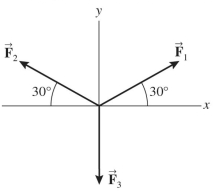
A) 140 N.
B) 70 N.
C) 35 N.
D) 210 N.
E) 0 N.
Three forces,
 each of magnitude 70 \mathrm{~N} , all act on an object as shown in the figure. The magnitude of the resultant force acting on the object is
each of magnitude 70 \mathrm{~N} , all act on an object as shown in the figure. The magnitude of the resultant force acting on the object is
A) 140 N.
B) 70 N.
C) 35 N.
D) 210 N.
E) 0 N.

Unlock Deck
Unlock for access to all 183 flashcards in this deck.
Unlock Deck
k this deck
31
Choose the one alternative that best completes the statement or answers the question.
Vector has a magnitude of 6.0 m and points
has a magnitude of 6.0 m and points  south of east. Vector
south of east. Vector  has a magnitude of 4.0 m and points
has a magnitude of 4.0 m and points  west of south. The resultant vector
west of south. The resultant vector  is given by
is given by
A) 7.2 m at an angle of south of east.
south of east.
B) 9.8 m at an angle of south of east.
south of east.
C) 3.3 m at an angle of south of east.
south of east.
D) 3.3 m at an angle of south of east.
south of east.
E) 9.8 m at an angle of south of east.
south of east.
Vector
 has a magnitude of 6.0 m and points
has a magnitude of 6.0 m and points  south of east. Vector
south of east. Vector  has a magnitude of 4.0 m and points
has a magnitude of 4.0 m and points  west of south. The resultant vector
west of south. The resultant vector  is given by
is given byA) 7.2 m at an angle of
 south of east.
south of east.B) 9.8 m at an angle of
 south of east.
south of east.C) 3.3 m at an angle of
 south of east.
south of east.D) 3.3 m at an angle of
 south of east.
south of east.E) 9.8 m at an angle of
 south of east.
south of east.
Unlock Deck
Unlock for access to all 183 flashcards in this deck.
Unlock Deck
k this deck
32
Write the word or phrase that best completes each statement or answers the question.
Three ropes are tied in a knot as shown in the figure. One student pulls on rope A with 1.0 pound of force, and another student pulls on rope B with 7.0 pounds of force. How hard and in what direction must you pull on rope C to balance the first two pulls? Give the direction by specifying the angle (clockwise or counterclockwise) of the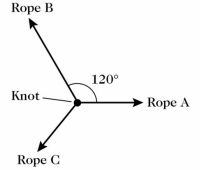
Three ropes are tied in a knot as shown in the figure. One student pulls on rope A with 1.0 pound of force, and another student pulls on rope B with 7.0 pounds of force. How hard and in what direction must you pull on rope C to balance the first two pulls? Give the direction by specifying the angle (clockwise or counterclockwise) of the


Unlock Deck
Unlock for access to all 183 flashcards in this deck.
Unlock Deck
k this deck
33
Write the word or phrase that best completes each statement or answers the question.
Find the magnitude and direction of the resultant of the three force vectors, shown in the figure. These vectors have the following magnitudes: A=5.0 lb, B=7.9 lb, and C=8.0 lb. Express the direction of the resultant by specifying the angle it makes with the +x -axis, with counterclockwise angles taken to be positive.
shown in the figure. These vectors have the following magnitudes: A=5.0 lb, B=7.9 lb, and C=8.0 lb. Express the direction of the resultant by specifying the angle it makes with the +x -axis, with counterclockwise angles taken to be positive.
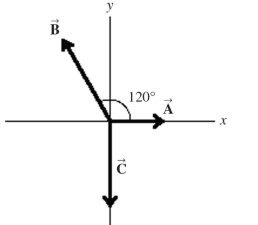
Find the magnitude and direction of the resultant of the three force vectors,
 shown in the figure. These vectors have the following magnitudes: A=5.0 lb, B=7.9 lb, and C=8.0 lb. Express the direction of the resultant by specifying the angle it makes with the +x -axis, with counterclockwise angles taken to be positive.
shown in the figure. These vectors have the following magnitudes: A=5.0 lb, B=7.9 lb, and C=8.0 lb. Express the direction of the resultant by specifying the angle it makes with the +x -axis, with counterclockwise angles taken to be positive.

Unlock Deck
Unlock for access to all 183 flashcards in this deck.
Unlock Deck
k this deck
34
Choose the one alternative that best completes the statement or answers the question.
An airplane undergoes the following displacements, all at the same altitude: First, it flies 59.0 km in a direction 30.0° east of north. Next, it flies 58.0 km due south. Finally, it flies 100 km 30.0° north of
West. Use components to determine how far the airplane ends up from its starting point.
A) 68.7 km
B) 74.4 km
C) 73.0 km
D) 71.5 km
E) 70.1 km
An airplane undergoes the following displacements, all at the same altitude: First, it flies 59.0 km in a direction 30.0° east of north. Next, it flies 58.0 km due south. Finally, it flies 100 km 30.0° north of
West. Use components to determine how far the airplane ends up from its starting point.
A) 68.7 km
B) 74.4 km
C) 73.0 km
D) 71.5 km
E) 70.1 km

Unlock Deck
Unlock for access to all 183 flashcards in this deck.
Unlock Deck
k this deck
35
Choose the one alternative that best completes the statement or answers the question.
Vector has a magnitude of 4.0 m and points
has a magnitude of 4.0 m and points  south of east. Vector
south of east. Vector  has a magnitude of 2.0 m and points
has a magnitude of 2.0 m and points  north of west. The resultant vector
north of west. The resultant vector  is given by
is given by
A) 2.0 m at an angle south of east.
south of east.
B) 1.0 m at an angle east of south.
east of south.
C) 2.0 m at an angle south of east.
south of east.
D) 10.0 m at an angle east of south.
east of south.
E) 10.0 m at an angle south of east.
south of east.
Vector
 has a magnitude of 4.0 m and points
has a magnitude of 4.0 m and points  south of east. Vector
south of east. Vector  has a magnitude of 2.0 m and points
has a magnitude of 2.0 m and points  north of west. The resultant vector
north of west. The resultant vector  is given by
is given byA) 2.0 m at an angle
 south of east.
south of east.B) 1.0 m at an angle
 east of south.
east of south.C) 2.0 m at an angle
 south of east.
south of east.D) 10.0 m at an angle
 east of south.
east of south.E) 10.0 m at an angle
 south of east.
south of east.
Unlock Deck
Unlock for access to all 183 flashcards in this deck.
Unlock Deck
k this deck
36
Choose the one alternative that best completes the statement or answers the question.
Vector has a magnitude of 6.0 m and points
has a magnitude of 6.0 m and points  east of south. Vector
east of south. Vector  has a magnitude of 4.0 m and points
has a magnitude of 4.0 m and points  west of north. The resultant vector
west of north. The resultant vector  is given by
is given by
A) 10.0 m at an angle of north of west.
north of west.
B) 2.0 m at an angle of north of west.
north of west.
C) 10.0 m at an angle of east of south.
east of south.
D) 2.0 m at an angle of east of south.
east of south.
E) 1.0 m at an angle of north of west.
north of west.
Vector
 has a magnitude of 6.0 m and points
has a magnitude of 6.0 m and points  east of south. Vector
east of south. Vector  has a magnitude of 4.0 m and points
has a magnitude of 4.0 m and points  west of north. The resultant vector
west of north. The resultant vector  is given by
is given byA) 10.0 m at an angle of
 north of west.
north of west.B) 2.0 m at an angle of
 north of west.
north of west.C) 10.0 m at an angle of
 east of south.
east of south.D) 2.0 m at an angle of
 east of south.
east of south.E) 1.0 m at an angle of
 north of west.
north of west.
Unlock Deck
Unlock for access to all 183 flashcards in this deck.
Unlock Deck
k this deck
37
Choose the one alternative that best completes the statement or answers the question.
Vector has a magnitude of 8.0 m and points east, vector
has a magnitude of 8.0 m and points east, vector  has a magnitude of 6.0 m and points north, and vector
has a magnitude of 6.0 m and points north, and vector  has a magnitude of 5.0 m and points west. The resultant vector
has a magnitude of 5.0 m and points west. The resultant vector  given by
given by
A) 2.0 m at an angle east of north.
east of north.
B) 6.7 m at an angle north of east.
north of east.
C) 6.7 m at an angle east of north.
east of north.
D) 3.8 m at an angle north of east
north of east
E) 2.0 m at an angle north of east.
north of east.
Vector
 has a magnitude of 8.0 m and points east, vector
has a magnitude of 8.0 m and points east, vector  has a magnitude of 6.0 m and points north, and vector
has a magnitude of 6.0 m and points north, and vector  has a magnitude of 5.0 m and points west. The resultant vector
has a magnitude of 5.0 m and points west. The resultant vector  given by
given byA) 2.0 m at an angle
 east of north.
east of north.B) 6.7 m at an angle
 north of east.
north of east.C) 6.7 m at an angle
 east of north.
east of north.D) 3.8 m at an angle
 north of east
north of eastE) 2.0 m at an angle
 north of east.
north of east.
Unlock Deck
Unlock for access to all 183 flashcards in this deck.
Unlock Deck
k this deck
38
Choose the one alternative that best completes the statement or answers the question.
Three forces, all act on an object, as shown in the figure. The magnitudes of the forces are:
all act on an object, as shown in the figure. The magnitudes of the forces are:  The resultant force acting on the object is given by
The resultant force acting on the object is given by
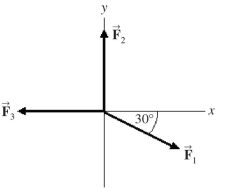
A) 40.0 N at an angle of with respect to +x -axis.
with respect to +x -axis.
B) 180 N at an angle of with respect to +x -axis.
with respect to +x -axis.
C) 20.0 N at an angle of with respect to +x -axis.
with respect to +x -axis.
D) 60.0 N at an angle of with respect to +x -axis.
with respect to +x -axis.
E) 35.5 N at an angle of with respect to +x -axis.
with respect to +x -axis.
Three forces,
 all act on an object, as shown in the figure. The magnitudes of the forces are:
all act on an object, as shown in the figure. The magnitudes of the forces are:  The resultant force acting on the object is given by
The resultant force acting on the object is given by
A) 40.0 N at an angle of
 with respect to +x -axis.
with respect to +x -axis.B) 180 N at an angle of
 with respect to +x -axis.
with respect to +x -axis.C) 20.0 N at an angle of
 with respect to +x -axis.
with respect to +x -axis.D) 60.0 N at an angle of
 with respect to +x -axis.
with respect to +x -axis.E) 35.5 N at an angle of
 with respect to +x -axis.
with respect to +x -axis.
Unlock Deck
Unlock for access to all 183 flashcards in this deck.
Unlock Deck
k this deck
39
Choose the one alternative that best completes the statement or answers the question.
Vector has a magnitude of 7.0 m and points
has a magnitude of 7.0 m and points  east of north. Vector
east of north. Vector  has a magnitude of 5.0 m and points
has a magnitude of 5.0 m and points  west of south. The resultant vector
west of south. The resultant vector  is given by
is given by
A) 10.0 m at an angle north of east.
north of east.
B) 10.0 m at an angle east of north.
east of north.
C) 1.0 m at an angle east of north
east of north
D) 2.0 m at an angle north of east.
north of east.
E) 2.0 m at an angle north of east.
north of east.
Vector
 has a magnitude of 7.0 m and points
has a magnitude of 7.0 m and points  east of north. Vector
east of north. Vector  has a magnitude of 5.0 m and points
has a magnitude of 5.0 m and points  west of south. The resultant vector
west of south. The resultant vector  is given by
is given byA) 10.0 m at an angle
 north of east.
north of east.B) 10.0 m at an angle
 east of north.
east of north.C) 1.0 m at an angle
 east of north
east of northD) 2.0 m at an angle
 north of east.
north of east.E) 2.0 m at an angle
 north of east.
north of east.
Unlock Deck
Unlock for access to all 183 flashcards in this deck.
Unlock Deck
k this deck
40
Write the word or phrase that best completes each statement or answers the question.
Two forces are acting on an object as shown in the figure. Assume that all the quantities
shown are accurate to three significant figures.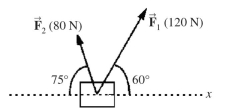 (a) What is the magnitude of the resultant force on the object?
(a) What is the magnitude of the resultant force on the object?
(b) What is the direction of the resultant force?
Two forces are acting on an object as shown in the figure. Assume that all the quantities
shown are accurate to three significant figures.
 (a) What is the magnitude of the resultant force on the object?
(a) What is the magnitude of the resultant force on the object?(b) What is the direction of the resultant force?

Unlock Deck
Unlock for access to all 183 flashcards in this deck.
Unlock Deck
k this deck
41
Write the word or phrase that best completes each statement or answers the question.
A runner runs on a circular path of radius 10 m. What is the magnitude of the
displacement of the jogger if he runs
(a) half-way around the track?
(b) all the way around the track?
A runner runs on a circular path of radius 10 m. What is the magnitude of the
displacement of the jogger if he runs
(a) half-way around the track?
(b) all the way around the track?

Unlock Deck
Unlock for access to all 183 flashcards in this deck.
Unlock Deck
k this deck
42
Choose the one alternative that best completes the statement or answers the question.
A ball is thrown with an initial velocity of 20 m/s at an angle of above the horizontal. If we can neglect air resistance, what is the horizontal component of its instantaneous velocity at the exact
above the horizontal. If we can neglect air resistance, what is the horizontal component of its instantaneous velocity at the exact
Top of its trajectory?
A) 10 m/s
B) 20 m/s
C) 17 m/s
D) zero
A ball is thrown with an initial velocity of 20 m/s at an angle of
 above the horizontal. If we can neglect air resistance, what is the horizontal component of its instantaneous velocity at the exact
above the horizontal. If we can neglect air resistance, what is the horizontal component of its instantaneous velocity at the exactTop of its trajectory?
A) 10 m/s
B) 20 m/s
C) 17 m/s
D) zero

Unlock Deck
Unlock for access to all 183 flashcards in this deck.
Unlock Deck
k this deck
43
Choose the one alternative that best completes the statement or answers the question.
A stone is thrown horizontally with an initial speed of 10 m/s from the edge of a cliff. A stopwatch measures the stone's trajectory time from the top of the cliff to the bottom to be 4.3 s. What is the
Height of the cliff if air resistance is negligibly small?
A) 43 m
B) 77 m
C) 22 m
D) 91 m
A stone is thrown horizontally with an initial speed of 10 m/s from the edge of a cliff. A stopwatch measures the stone's trajectory time from the top of the cliff to the bottom to be 4.3 s. What is the
Height of the cliff if air resistance is negligibly small?
A) 43 m
B) 77 m
C) 22 m
D) 91 m

Unlock Deck
Unlock for access to all 183 flashcards in this deck.
Unlock Deck
k this deck
44
Choose the one alternative that best completes the statement or answers the question.
Four vectors,
are shown in the figure. The sum of these four vectors is a vector having magnitude and direction
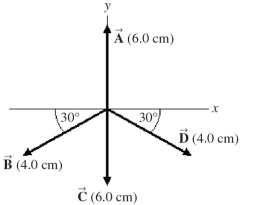
A) 4.0 cm , along +x -axis.
B) 4.0 cm , along -x -axis.
C) 4.0 cm , above +x -axis.
above +x -axis.
D) 4.0 cm , along -y -axis.
E) 4.0 cm , along +y -axis.
Four vectors,

are shown in the figure. The sum of these four vectors is a vector having magnitude and direction

A) 4.0 cm , along +x -axis.
B) 4.0 cm , along -x -axis.
C) 4.0 cm ,
 above +x -axis.
above +x -axis.D) 4.0 cm , along -y -axis.
E) 4.0 cm , along +y -axis.

Unlock Deck
Unlock for access to all 183 flashcards in this deck.
Unlock Deck
k this deck
45
Choose the one alternative that best completes the statement or answers the question.
Vector has a magnitude of
has a magnitude of  m and points
m and points  north of east; vector
north of east; vector  has a magnitude of
has a magnitude of  m and points
m and points  west of north; and vector
west of north; and vector  has a magnitude of
has a magnitude of  m and points
m and points  west of south. The resultant vector
west of south. The resultant vector  is given by
is given by
A) 5.1 m at an angle north of east.
north of east.
B) 2.1 m at an angle east of north.
east of north.
C) 4.8 m at an angle east of north.
east of north.
D) 5.9 m at an angle north of east.
north of east.
E) 2.7 m at an angle north of east.
north of east.
Vector
 has a magnitude of
has a magnitude of  m and points
m and points  north of east; vector
north of east; vector  has a magnitude of
has a magnitude of  m and points
m and points  west of north; and vector
west of north; and vector  has a magnitude of
has a magnitude of  m and points
m and points  west of south. The resultant vector
west of south. The resultant vector  is given by
is given byA) 5.1 m at an angle
 north of east.
north of east.B) 2.1 m at an angle
 east of north.
east of north.C) 4.8 m at an angle
 east of north.
east of north.D) 5.9 m at an angle
 north of east.
north of east.E) 2.7 m at an angle
 north of east.
north of east.
Unlock Deck
Unlock for access to all 183 flashcards in this deck.
Unlock Deck
k this deck
46
Choose the one alternative that best completes the statement or answers the question.
A ball thrown horizontally from a point 24 m above the ground, strikes the ground after traveling horizontally a distance of 18 m. With what speed was it thrown, assuming negligible air
Resistance?
A) 8.1 m/s
B) 6.1 m/s
C) 7.4 m/s
D) 8.9 m/s
A ball thrown horizontally from a point 24 m above the ground, strikes the ground after traveling horizontally a distance of 18 m. With what speed was it thrown, assuming negligible air
Resistance?
A) 8.1 m/s
B) 6.1 m/s
C) 7.4 m/s
D) 8.9 m/s

Unlock Deck
Unlock for access to all 183 flashcards in this deck.
Unlock Deck
k this deck
47
Choose the one alternative that best completes the statement or answers the question.
The figure shows four vectors, having magnitudes 12.0 m, 10.0 m, 8.0 m, and 4.0 m, respectively. The sum of these four vectors is
having magnitudes 12.0 m, 10.0 m, 8.0 m, and 4.0 m, respectively. The sum of these four vectors is
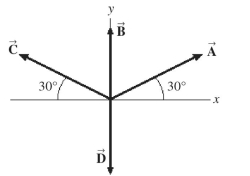
A) 19.5 m at an angle with respect to +x -axis.
with respect to +x -axis.
B) 8.20 m at an angle with respect to +x -axis.
with respect to +x -axis.
C) 16.4 m at an angle with respect to +x -axis.
with respect to +x -axis.
D) 19.5 m at an angle with respect to +x -axis.
with respect to +x -axis.
E) 16.4 m at an angle with respect to +x -axis.
with respect to +x -axis.
The figure shows four vectors,
 having magnitudes 12.0 m, 10.0 m, 8.0 m, and 4.0 m, respectively. The sum of these four vectors is
having magnitudes 12.0 m, 10.0 m, 8.0 m, and 4.0 m, respectively. The sum of these four vectors is
A) 19.5 m at an angle
 with respect to +x -axis.
with respect to +x -axis.B) 8.20 m at an angle
 with respect to +x -axis.
with respect to +x -axis.C) 16.4 m at an angle
 with respect to +x -axis.
with respect to +x -axis.D) 19.5 m at an angle
 with respect to +x -axis.
with respect to +x -axis.E) 16.4 m at an angle
 with respect to +x -axis.
with respect to +x -axis.
Unlock Deck
Unlock for access to all 183 flashcards in this deck.
Unlock Deck
k this deck
48
Write the word or phrase that best completes each statement or answers the question.
A player hits a tennis ball into the air with an initial velocity of 32 m/s at from the vertical. How fast is the ball moving at the highest point in its trajectory if air resistance is negligible?
from the vertical. How fast is the ball moving at the highest point in its trajectory if air resistance is negligible?
A player hits a tennis ball into the air with an initial velocity of 32 m/s at
 from the vertical. How fast is the ball moving at the highest point in its trajectory if air resistance is negligible?
from the vertical. How fast is the ball moving at the highest point in its trajectory if air resistance is negligible?
Unlock Deck
Unlock for access to all 183 flashcards in this deck.
Unlock Deck
k this deck
49
Write the word or phrase that best completes each statement or answers the question.
The figure shows three vectors, along with their magnitudes. Determine the magnitude and direction of the vector given by
along with their magnitudes. Determine the magnitude and direction of the vector given by 
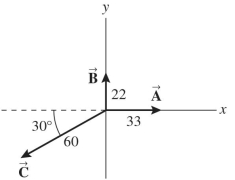
The figure shows three vectors,
 along with their magnitudes. Determine the magnitude and direction of the vector given by
along with their magnitudes. Determine the magnitude and direction of the vector given by 


Unlock Deck
Unlock for access to all 183 flashcards in this deck.
Unlock Deck
k this deck
50
Write the word or phrase that best completes each statement or answers the question.
The figure shows four vectors, Vectors
Vectors  both have a magnitude of 7.0 cm, and vectors
both have a magnitude of 7.0 cm, and vectors 
both have a magnitude of 4.0 cm. Find the magnitude and direction of the sum of these four vectors.
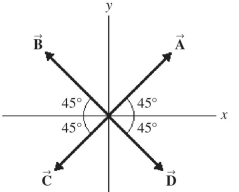
The figure shows four vectors,
 Vectors
Vectors  both have a magnitude of 7.0 cm, and vectors
both have a magnitude of 7.0 cm, and vectors 
both have a magnitude of 4.0 cm. Find the magnitude and direction of the sum of these four vectors.


Unlock Deck
Unlock for access to all 183 flashcards in this deck.
Unlock Deck
k this deck
51
Choose the one alternative that best completes the statement or answers the question.
A ball is thrown at an original speed of 8.0 m/s at an angle of above the horizontal. If there is no air resistance, what is the speed of the ball when it returns to the same horizontal level?
above the horizontal. If there is no air resistance, what is the speed of the ball when it returns to the same horizontal level?
A) 9.8 m/s
B) 8.0 m/s
C) 4.0 m/s
D) 16 m/s
A ball is thrown at an original speed of 8.0 m/s at an angle of
 above the horizontal. If there is no air resistance, what is the speed of the ball when it returns to the same horizontal level?
above the horizontal. If there is no air resistance, what is the speed of the ball when it returns to the same horizontal level?A) 9.8 m/s
B) 8.0 m/s
C) 4.0 m/s
D) 16 m/s

Unlock Deck
Unlock for access to all 183 flashcards in this deck.
Unlock Deck
k this deck
52
Choose the one alternative that best completes the statement or answers the question.
The acceleration due to gravity on the Moon is only one-sixth of that on Earth, and the Moon has no atmosphere. If you hit a baseball on the Moon with the same effort (and therefore at the speed
And angle) as on Earth, how far would the ball would travel on the Moon compared to on Earth?
Neglect air resistance on Earth.
A)
B) 6 times as far as on Earth
C) the same distance as on Earth
D) 1 / 6 as far as on Earth
E) 36 times as far as on Earth
The acceleration due to gravity on the Moon is only one-sixth of that on Earth, and the Moon has no atmosphere. If you hit a baseball on the Moon with the same effort (and therefore at the speed
And angle) as on Earth, how far would the ball would travel on the Moon compared to on Earth?
Neglect air resistance on Earth.
A)

B) 6 times as far as on Earth
C) the same distance as on Earth
D) 1 / 6 as far as on Earth
E) 36 times as far as on Earth

Unlock Deck
Unlock for access to all 183 flashcards in this deck.
Unlock Deck
k this deck
53
Write the word or phrase that best completes each statement or answers the question.
The figure shows four vectors, Vectors
Vectors  each have a magnitude of 7.0 cm, and vectors
each have a magnitude of 7.0 cm, and vectors  each have a magnitude of 4.0 cm. Find the x and y components of the sum of these four vectors.
each have a magnitude of 4.0 cm. Find the x and y components of the sum of these four vectors.
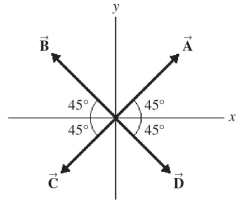
The figure shows four vectors,
 Vectors
Vectors  each have a magnitude of 7.0 cm, and vectors
each have a magnitude of 7.0 cm, and vectors  each have a magnitude of 4.0 cm. Find the x and y components of the sum of these four vectors.
each have a magnitude of 4.0 cm. Find the x and y components of the sum of these four vectors.

Unlock Deck
Unlock for access to all 183 flashcards in this deck.
Unlock Deck
k this deck
54
Choose the one alternative that best completes the statement or answers the question.
Three vectors, , have the components shown in the table. What is the magnitude of the resultant of these three vectors?
, have the components shown in the table. What is the magnitude of the resultant of these three vectors?
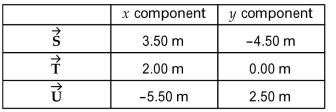
A) 2.00 m
B) 13.0 m
C) 11.1 m
D) 5.50 m
E) 7.00 m
Three vectors,
 , have the components shown in the table. What is the magnitude of the resultant of these three vectors?
, have the components shown in the table. What is the magnitude of the resultant of these three vectors?
A) 2.00 m
B) 13.0 m
C) 11.1 m
D) 5.50 m
E) 7.00 m

Unlock Deck
Unlock for access to all 183 flashcards in this deck.
Unlock Deck
k this deck
55
Write the word or phrase that best completes each statement or answers the question.
The figure shows three vectors, along with their magnitudes. Determine the magnitude and direction of the vector given by
along with their magnitudes. Determine the magnitude and direction of the vector given by 
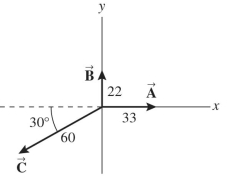
The figure shows three vectors,
 along with their magnitudes. Determine the magnitude and direction of the vector given by
along with their magnitudes. Determine the magnitude and direction of the vector given by 


Unlock Deck
Unlock for access to all 183 flashcards in this deck.
Unlock Deck
k this deck
56
Write the word or phrase that best completes each statement or answers the question.
As shown in the figure, a heavy rock is shot upward from the edge of a vertical cliff. It
leaves the edge of the cliff with an initial velocity of 15 m/s directed at from the vertical
from the vertical
and experiences no appreciable air resistance as it travels. How high is the cliff?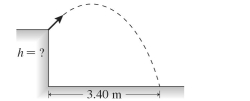
As shown in the figure, a heavy rock is shot upward from the edge of a vertical cliff. It
leaves the edge of the cliff with an initial velocity of 15 m/s directed at
 from the vertical
from the verticaland experiences no appreciable air resistance as it travels. How high is the cliff?


Unlock Deck
Unlock for access to all 183 flashcards in this deck.
Unlock Deck
k this deck
57
Write the word or phrase that best completes each statement or answers the question.
The figure shows three vectors, having magnitudes 7.0 cm, 6.0 cm, and 4.0 cm, respectively. Find the x and y components of the resultant of these three vectors.
having magnitudes 7.0 cm, 6.0 cm, and 4.0 cm, respectively. Find the x and y components of the resultant of these three vectors.
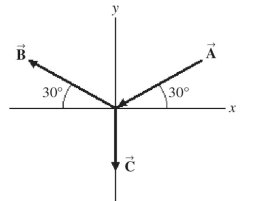
The figure shows three vectors,
 having magnitudes 7.0 cm, 6.0 cm, and 4.0 cm, respectively. Find the x and y components of the resultant of these three vectors.
having magnitudes 7.0 cm, 6.0 cm, and 4.0 cm, respectively. Find the x and y components of the resultant of these three vectors.

Unlock Deck
Unlock for access to all 183 flashcards in this deck.
Unlock Deck
k this deck
58
Write the word or phrase that best completes each statement or answers the question.
The figure shows four vectors, having magnitudes 10.0 m, 8.00 m, 6.00 m, and 2.00 m, respectively. Find the magnitude of the sum of these four vectors.
having magnitudes 10.0 m, 8.00 m, 6.00 m, and 2.00 m, respectively. Find the magnitude of the sum of these four vectors.
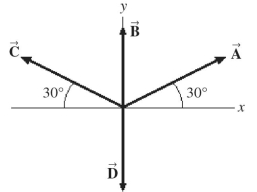
The figure shows four vectors,
 having magnitudes 10.0 m, 8.00 m, 6.00 m, and 2.00 m, respectively. Find the magnitude of the sum of these four vectors.
having magnitudes 10.0 m, 8.00 m, 6.00 m, and 2.00 m, respectively. Find the magnitude of the sum of these four vectors.

Unlock Deck
Unlock for access to all 183 flashcards in this deck.
Unlock Deck
k this deck
59
Choose the one alternative that best completes the statement or answers the question.
Three vectors, , have the components shown in the table. What angle does the resultant of these three vectors make with the
, have the components shown in the table. What angle does the resultant of these three vectors make with the 
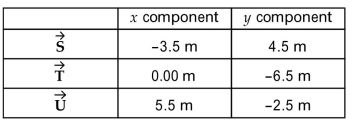
A)
B)
C)
D)
Three vectors,
 , have the components shown in the table. What angle does the resultant of these three vectors make with the
, have the components shown in the table. What angle does the resultant of these three vectors make with the 

A)

B)

C)

D)


Unlock Deck
Unlock for access to all 183 flashcards in this deck.
Unlock Deck
k this deck
60
Choose the one alternative that best completes the statement or answers the question.
A girl throws a rock horizontally, with a velocity of 10 m/s, from a bridge. It falls 20 m to the water below. How far does the rock travel horizontally before striking the water, assuming negligible air
Resistance?
A) 16 m
B) 24 m
C) 20 m
D) 14 m
A girl throws a rock horizontally, with a velocity of 10 m/s, from a bridge. It falls 20 m to the water below. How far does the rock travel horizontally before striking the water, assuming negligible air
Resistance?
A) 16 m
B) 24 m
C) 20 m
D) 14 m

Unlock Deck
Unlock for access to all 183 flashcards in this deck.
Unlock Deck
k this deck
61
Write the word or phrase that best completes each statement or answers the question.
A girl throws a rock horizontally with a speed of 12 m/s from a bridge. It falls 2 before hitting the water below. Neglect air resistance.
before hitting the water below. Neglect air resistance.
(a) How high is the bridge from the water below?
(b) How far horizontally does the rock travel before striking the water?
A girl throws a rock horizontally with a speed of 12 m/s from a bridge. It falls 2
 before hitting the water below. Neglect air resistance.
before hitting the water below. Neglect air resistance.(a) How high is the bridge from the water below?
(b) How far horizontally does the rock travel before striking the water?

Unlock Deck
Unlock for access to all 183 flashcards in this deck.
Unlock Deck
k this deck
62
Choose the one alternative that best completes the statement or answers the question.
In a room where g = 9.81 m/s², a hockey puck slides off the edge of a platform with an initial velocity of 28.0 m/s horizontally. The height of the platform above the ground is 2.00 m. What is
The speed of the puck just before it hits the ground? The air resistance is negligibly small.
A) 28.7 m/s
B) 6.26 m/s
C) 28.0 m/s
D) 48.2 m/s
E) 26.3 m/s
In a room where g = 9.81 m/s², a hockey puck slides off the edge of a platform with an initial velocity of 28.0 m/s horizontally. The height of the platform above the ground is 2.00 m. What is
The speed of the puck just before it hits the ground? The air resistance is negligibly small.
A) 28.7 m/s
B) 6.26 m/s
C) 28.0 m/s
D) 48.2 m/s
E) 26.3 m/s

Unlock Deck
Unlock for access to all 183 flashcards in this deck.
Unlock Deck
k this deck
63
Write the word or phrase that best completes each statement or answers the question.



Unlock Deck
Unlock for access to all 183 flashcards in this deck.
Unlock Deck
k this deck
64
Write the word or phrase that best completes each statement or answers the question.
At target practice, a rifle bullet is fired at an angle o ° below the horizontal with an
° below the horizontal with an
initial velocity of 800 m/s from the top of a cliff 80 m high. How far from the base of the
cliff does it strike the level ground below if air resistance is negligible?
At target practice, a rifle bullet is fired at an angle o
 ° below the horizontal with an
° below the horizontal with aninitial velocity of 800 m/s from the top of a cliff 80 m high. How far from the base of the
cliff does it strike the level ground below if air resistance is negligible?

Unlock Deck
Unlock for access to all 183 flashcards in this deck.
Unlock Deck
k this deck
65
Choose the one alternative that best completes the statement or answers the question.
A boy throws a rock with an initial velocity of above the horizontal. How long does it take for the rock to reach the maximum height of its trajectory if air resistance is negligibly
above the horizontal. How long does it take for the rock to reach the maximum height of its trajectory if air resistance is negligibly 
A) 0.160 s
B) 0.441 s
C) 0.313 s
D) 0.282 s
A boy throws a rock with an initial velocity of
 above the horizontal. How long does it take for the rock to reach the maximum height of its trajectory if air resistance is negligibly
above the horizontal. How long does it take for the rock to reach the maximum height of its trajectory if air resistance is negligibly 
A) 0.160 s
B) 0.441 s
C) 0.313 s
D) 0.282 s

Unlock Deck
Unlock for access to all 183 flashcards in this deck.
Unlock Deck
k this deck
66
Choose the one alternative that best completes the statement or answers the question.
A plane flying horizontally at a speed of 50 m/s and at an elevation of 160 m drops a package, and 2.0 s later it drops a second package. How far apart will the two packages land on the ground if air
Resistance is negligible?
A) 320 m
B) 100 m
C) 160 m
D) 180 m
A plane flying horizontally at a speed of 50 m/s and at an elevation of 160 m drops a package, and 2.0 s later it drops a second package. How far apart will the two packages land on the ground if air
Resistance is negligible?
A) 320 m
B) 100 m
C) 160 m
D) 180 m

Unlock Deck
Unlock for access to all 183 flashcards in this deck.
Unlock Deck
k this deck
67
Choose the one alternative that best completes the statement or answers the question.
You throw a rock horizontally off a cliff with a speed of 20 m/s and no significant air resistance. After 2.0 s, the magnitude of the velocity of the rock is closest to
A) 28 m/s
B) 37 m/s
C) 20 m/s
D) 40 m/s
You throw a rock horizontally off a cliff with a speed of 20 m/s and no significant air resistance. After 2.0 s, the magnitude of the velocity of the rock is closest to
A) 28 m/s
B) 37 m/s
C) 20 m/s
D) 40 m/s

Unlock Deck
Unlock for access to all 183 flashcards in this deck.
Unlock Deck
k this deck
68
Write the word or phrase that best completes each statement or answers the question.
A marble moving 1.48 m/s rolls off the top edge of a 125-cm high table in a room where
there is no appreciable air resistance and the acceleration due to gravity is 9 (a) How far from the base of the table will it strike the floor?
(a) How far from the base of the table will it strike the floor?
(b) How long will it be in the air?
A marble moving 1.48 m/s rolls off the top edge of a 125-cm high table in a room where
there is no appreciable air resistance and the acceleration due to gravity is 9
 (a) How far from the base of the table will it strike the floor?
(a) How far from the base of the table will it strike the floor?(b) How long will it be in the air?

Unlock Deck
Unlock for access to all 183 flashcards in this deck.
Unlock Deck
k this deck
69
Write the word or phrase that best completes each statement or answers the question.
A shell is launched with a velocity of 100 m/s at an angle of 30.0° above horizontal from a
point on a cliff 50.0 m above a level plain below. How far from the base of the cliff does
the shell strike the ground? There is no appreciable air resistance, and at the
at the
location of the cliff.
A shell is launched with a velocity of 100 m/s at an angle of 30.0° above horizontal from a
point on a cliff 50.0 m above a level plain below. How far from the base of the cliff does
the shell strike the ground? There is no appreciable air resistance, and
 at the
at thelocation of the cliff.

Unlock Deck
Unlock for access to all 183 flashcards in this deck.
Unlock Deck
k this deck
70
Choose the one alternative that best completes the statement or answers the question.
A hockey puck slides off the edge of a horizontal platform with an initial velocity of 20 m/s horizontally and experiences no significant air resistance. The height of the platform above the
Ground is 2.0 m. What is the magnitude of the vertical component of the velocity of the puck just
Before it hits the ground?
A) 15 m/s
B) 21 m/s
C) 6.3 m/s
D) 20 m/s
E) 13 m/s
A hockey puck slides off the edge of a horizontal platform with an initial velocity of 20 m/s horizontally and experiences no significant air resistance. The height of the platform above the
Ground is 2.0 m. What is the magnitude of the vertical component of the velocity of the puck just
Before it hits the ground?
A) 15 m/s
B) 21 m/s
C) 6.3 m/s
D) 20 m/s
E) 13 m/s

Unlock Deck
Unlock for access to all 183 flashcards in this deck.
Unlock Deck
k this deck
71
Choose the one alternative that best completes the statement or answers the question.
A hockey puck slides off the edge of a platform with an initial velocity of 20 m/s horizontally. The height of the platform above the ground is 2.0 m. What is the magnitude of the velocity of the puck
Just before it touches the ground? You can neglect air resistance.
A) 25 m/s
B) 6.3 m/s
C) 22 m/s
D) 21 m/s
E) 24 m/s
A hockey puck slides off the edge of a platform with an initial velocity of 20 m/s horizontally. The height of the platform above the ground is 2.0 m. What is the magnitude of the velocity of the puck
Just before it touches the ground? You can neglect air resistance.
A) 25 m/s
B) 6.3 m/s
C) 22 m/s
D) 21 m/s
E) 24 m/s

Unlock Deck
Unlock for access to all 183 flashcards in this deck.
Unlock Deck
k this deck
72
Write the word or phrase that best completes each statement or answers the question.
Enzo throws a rock horizontally with a speed of 12 m/s from a bridge. It falls for 2.28 s
before reaching the water below with no appreciable air resistance. Just as the rock
reaches the water, find
(a) the horizontal component of its velocity.
(b) the speed with which it is moving.
Enzo throws a rock horizontally with a speed of 12 m/s from a bridge. It falls for 2.28 s
before reaching the water below with no appreciable air resistance. Just as the rock
reaches the water, find
(a) the horizontal component of its velocity.
(b) the speed with which it is moving.

Unlock Deck
Unlock for access to all 183 flashcards in this deck.
Unlock Deck
k this deck
73
Write the word or phrase that best completes each statement or answers the question.
A batter hits a home run in which the ball travels 110 m horizontally with no appreciable
air resistance. If the ball left the bat at above the horizontal just above ground level,
above the horizontal just above ground level,
how fast was it hit?
A batter hits a home run in which the ball travels 110 m horizontally with no appreciable
air resistance. If the ball left the bat at
 above the horizontal just above ground level,
above the horizontal just above ground level,how fast was it hit?

Unlock Deck
Unlock for access to all 183 flashcards in this deck.
Unlock Deck
k this deck
74
Write the word or phrase that best completes each statement or answers the question.
A hunter points a rifle horizontally and holds it 3.30 m above the ground. The bullet leaves
the barrel at 325 m/s and experiences no significant air resistance. The acceleration due to
gravity at this location (a) How long does it take for the bullet to strike the ground?
(a) How long does it take for the bullet to strike the ground?
(b) How far horizontally does it travel?
A hunter points a rifle horizontally and holds it 3.30 m above the ground. The bullet leaves
the barrel at 325 m/s and experiences no significant air resistance. The acceleration due to
gravity at this location
 (a) How long does it take for the bullet to strike the ground?
(a) How long does it take for the bullet to strike the ground?(b) How far horizontally does it travel?

Unlock Deck
Unlock for access to all 183 flashcards in this deck.
Unlock Deck
k this deck
75
Choose the one alternative that best completes the statement or answers the question.
A ball rolls over the edge of a platform with only a horizontal velocity. The height of the platform is 1.6 m and the horizontal range of the ball from the base of the platform is 20 m. What is the
Horizontal velocity of the ball just before it touches the ground? Neglect air resistance.
A) 9.8 m/s
B) 70 m/s
C) 20 m/s
D) 4.9 m/s
E) 35 m/s
A ball rolls over the edge of a platform with only a horizontal velocity. The height of the platform is 1.6 m and the horizontal range of the ball from the base of the platform is 20 m. What is the
Horizontal velocity of the ball just before it touches the ground? Neglect air resistance.
A) 9.8 m/s
B) 70 m/s
C) 20 m/s
D) 4.9 m/s
E) 35 m/s

Unlock Deck
Unlock for access to all 183 flashcards in this deck.
Unlock Deck
k this deck
76
Choose the one alternative that best completes the statement or answers the question.
A football kicker is attempting a field goal from 44 m out. The ball is kicked and just clears the lower bar with a time of flight of 2.9 s. If the angle of the kick wa , what was the initial speed of
, what was the initial speed of
The ball, assuming no air resistance?
A) 19.7 m/s
B) 21.5 m/s
C) 39 m/s
D) 2.2 m/s
A football kicker is attempting a field goal from 44 m out. The ball is kicked and just clears the lower bar with a time of flight of 2.9 s. If the angle of the kick wa
 , what was the initial speed of
, what was the initial speed ofThe ball, assuming no air resistance?
A) 19.7 m/s
B) 21.5 m/s
C) 39 m/s
D) 2.2 m/s

Unlock Deck
Unlock for access to all 183 flashcards in this deck.
Unlock Deck
k this deck
77
Choose the one alternative that best completes the statement or answers the question.
A fisherman casts his bait toward the river at an angle of above the horizontal. As the line unravels, he notices that the bait and hook reach a maximum height of 2.9 m. What was the initial
above the horizontal. As the line unravels, he notices that the bait and hook reach a maximum height of 2.9 m. What was the initial
Velocity he launched the bait with? Assume that the line exerts no appreciable drag force on the
Bait and hook and that air resistance is negligible.
A) 7.6 m/s
B) 6.3 m/s
C) 18 m/s
D) 7.9 m/s
A fisherman casts his bait toward the river at an angle of
 above the horizontal. As the line unravels, he notices that the bait and hook reach a maximum height of 2.9 m. What was the initial
above the horizontal. As the line unravels, he notices that the bait and hook reach a maximum height of 2.9 m. What was the initialVelocity he launched the bait with? Assume that the line exerts no appreciable drag force on the
Bait and hook and that air resistance is negligible.
A) 7.6 m/s
B) 6.3 m/s
C) 18 m/s
D) 7.9 m/s

Unlock Deck
Unlock for access to all 183 flashcards in this deck.
Unlock Deck
k this deck
78
Choose the one alternative that best completes the statement or answers the question.
A hockey puck slides off the edge of a horizontal platform with an initial velocity of 28.0 m/shorizontally in a city where the acceleration due to gravity is 9.81 m/s². The puck experiences
No significant air resistance as it falls. The height of the platform above the ground is 2.00 m. What
Is the angle below the horizontal of the velocity of the puck just before it hits the ground?
A)
B)
C)
D)
E)
A hockey puck slides off the edge of a horizontal platform with an initial velocity of 28.0 m/shorizontally in a city where the acceleration due to gravity is 9.81 m/s². The puck experiences
No significant air resistance as it falls. The height of the platform above the ground is 2.00 m. What
Is the angle below the horizontal of the velocity of the puck just before it hits the ground?
A)

B)

C)

D)

E)


Unlock Deck
Unlock for access to all 183 flashcards in this deck.
Unlock Deck
k this deck
79
Write the word or phrase that best completes each statement or answers the question.
A celebrating student throws a water balloon horizontally from a dormitory window that
is 50 m above the ground. It hits the ground at a point 60 m from the building without
appreciable air resistance.
(a) What will be the horizontal component of the velocity of the balloon just before it hits
the ground?
(b) What will be the magnitude of the vertical velocity of the balloon just before it hits the
ground?
A celebrating student throws a water balloon horizontally from a dormitory window that
is 50 m above the ground. It hits the ground at a point 60 m from the building without
appreciable air resistance.
(a) What will be the horizontal component of the velocity of the balloon just before it hits
the ground?
(b) What will be the magnitude of the vertical velocity of the balloon just before it hits the
ground?

Unlock Deck
Unlock for access to all 183 flashcards in this deck.
Unlock Deck
k this deck
80
Choose the one alternative that best completes the statement or answers the question.
A cat leaps to try to catch a bird. If the cat's jump was at off the ground and its initial velocity was 2.74 m/s, what is the highest point of its trajectory, neglecting air resistance?
off the ground and its initial velocity was 2.74 m/s, what is the highest point of its trajectory, neglecting air resistance?
A) 10.96 m
B) 0.19 m
C) 0.58 m
D) 0.29 m
A cat leaps to try to catch a bird. If the cat's jump was at
 off the ground and its initial velocity was 2.74 m/s, what is the highest point of its trajectory, neglecting air resistance?
off the ground and its initial velocity was 2.74 m/s, what is the highest point of its trajectory, neglecting air resistance?A) 10.96 m
B) 0.19 m
C) 0.58 m
D) 0.29 m

Unlock Deck
Unlock for access to all 183 flashcards in this deck.
Unlock Deck
k this deck


